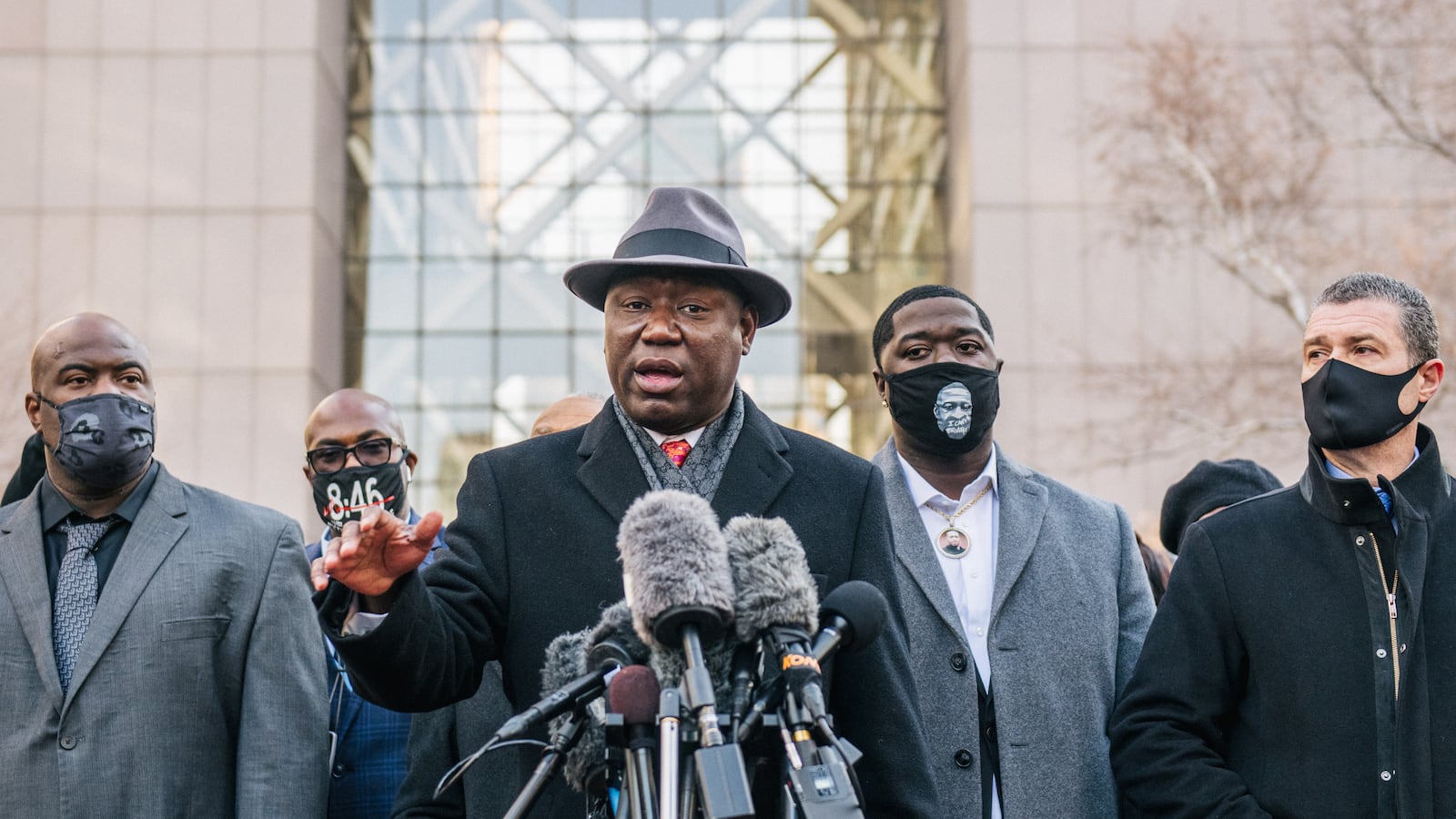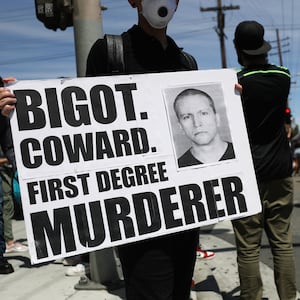Moments before opening arguments in the murder trial of the former Minneapolis police officer who kneeled on George Floyd’s neck, the 46-year-old’s family issued a message to prosecutors: “America is watching.”
“It’s cold out here, but the heat is on,” his brother Philonise Floyd, flanked by family and attorneys, said ahead of Derek Chauvin’s long-awaited trial in Hennepin County court on Monday in front of dozens of supporters and camera crews, adding,” This is a starting point, not the finishing point.”
“The color of your skin should not be a death sentence,” he added. “We will not allow Derek Chauvin to be the Judge, the Prosecutor, and the Executioner.”
The plea for justice comes less than a year after a video of Floyd’s death went viral and launched a nationwide protest wave over police brutality. Civil rights attorney Ben Crump, who is representing the Floyd family, noted that opening arguments were just the start of “a four-week journey to justice.”
“Today starts a landmark trial that will be a referendum on how far America has come in its quest for equality and justice for all,” Crump said. “This trial will prove if we live up to the belief that all men are created equal.”
Chauvin, one of the four officers charged for his involvement in George Floyd’s death, currently faces third-degree murder, second-degree murder, and second-degree manslaughter charges in connection with the fatal arrest of Floyd over an alleged counterfeit $20 bill on May 25. He has pleaded not guilty. According to body-camera footage, Chauvin had his knee on Floyd’s neck for about eight minutes—including nearly three minutes in which Floyd was unresponsive. He faces up to 40 years in prison.
“Please, please, please, I can’t breathe. Please, man,” Floyd said in the viral footage, which didn’t show the beginning of the arrest. “I’m about to die.”
By the time Floyd was loaded into an ambulance, EMTs said, he had no pulse. The Hennepin County Medical Examiner later concluded Floyd died of cardiac arrest from the restraint and neck compression, also noting that Floyd had heart disease and there was fentanyl in his system. An independent report commissioned by Floyd’s family, however, concluded that the 46-year-old died of strangulation from the pressure to his back and neck.
Both reports determined Floyd’s death was a homicide.
Three other officers—Tou Thao, Thomas K. Lane, and J. Alexander Kueng—assisted with the arrest, holding down Floyd’s legs and trying to keep concerned bystanders at bay. They’ve been charged with aiding and abetting second-degree murder while committing a felony, as well as aiding and abetting second-degree manslaughter with culpable negligence, and are expected to face a trial together in August. All three have pleaded not guilty.
A 12-person jury made up of nine women and six men will now decide if Chauvin intended to harm Floyd during the arrest captured in a 10-minute video that sent shockwaves through the country. Long-simmering anger about racial injustice and police brutality exploded, prompting people to take to the streets in historic—and sometimes violent—protests. Floyd’s final pleas became a rallying cry, bringing renewed energy to the Black Lives Matter movement.
The jury, which includes two alternates, is made up of nine women and five men whose ages range from 20 to 60. Eight of the jurors identify as white, four as Black, and two as mixed-race.
“The facts are simple what killed George Floyd was an overdose of excessive force,” Crump said, adding “that this murder case is not hard. Just look at the torture video of George Floyd.”
In court on Monday, Chauvin’s lawyer, Erin Nelson, was expected to argue that the May 2020 tragedy was not his client’s fault—but instead the deadly combination of Floyd’s alleged previous drug use and other rookie cops who did not respond quick enough during the arrest.
“If EMS had arrived just three minutes sooner, Mr. Floyd may have survived. If Kueng and Lane had chosen to de-escalate instead of struggle, Mr. Floyd may have survived,” Nelson wrote in a September filing. “If Kueng and Lane had recognized the apparent signs of an opioid overdose and rendered aid, such as administering naloxone, Mr. Floyd may have survived.”
But Rodney Floyd, one of the 46-year-old’s brothers, encouraged America “not to believe the lie” offered by the defense, insisting that his sibling “was murdered in the streets.”
At the end of the press conference, Floyd’s lawyers and family members led the crowd in an eight-minute and 46 second moment of silence in honor of the amount of time Chauvin held his knee on Floyd’s neck. (While the original criminal complaint against Chauvin says he held his knee down for almost nine minutes, that number was later changed to seven minutes and 46 seconds.)
When someone in the crowd complained of joint pain, Crump, the attorney, was ready with a rejoinder: “Derek Chauvin didn’t change knees.”







